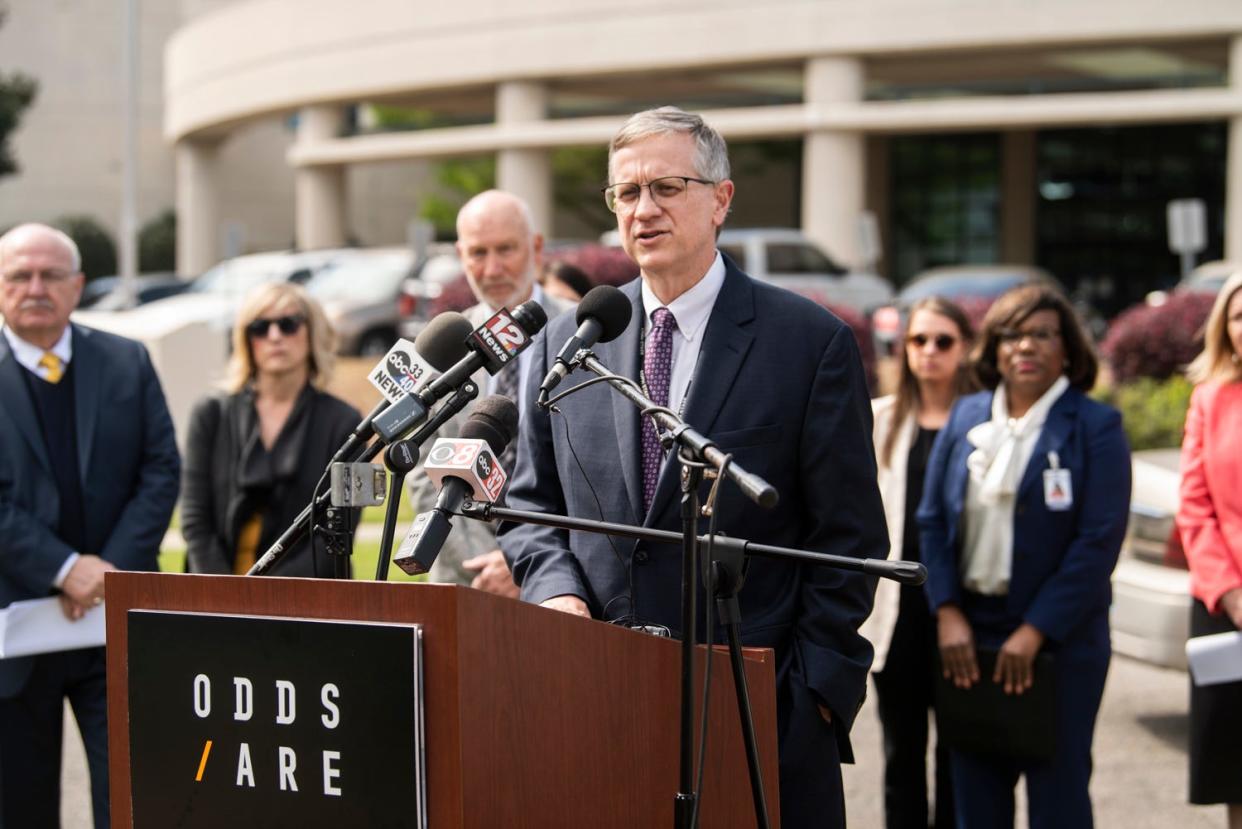What Alabama doctors say everyone needs to know about fentanyl

A group of Alabama health organizations launched an initiative Monday to bring more awareness to the dangers of fentanyl, as fentanyl-related deaths have continued to rise in the state since 2020.
Over the next year, Odds Are Alabama will platform the stories of families who have suffered from fentanyl overdoses, promote resources for people with substance use problems and utilize social media to share the initiative’s message.
“Fentanyl is a plague in Alabama,” Alabama Health Officer Scott Harris said. “Fentanyl causes deaths that are usually needless. They’re often in our young people, and we all have to do something to improve this for the sake of every one of us.”
What does fentanyl look like in Alabama?
The synthetic opioid was originally developed for pain management in cancer patients, but as the nation’s opioid epidemic has progressed, illegal drug manufacturers have abused the substance, adding small doses of fentanyl to other drugs in order to increase the potency.
Fentanyl can be present in marijuana, heroin or illegal pills made to look like OxyContin, Percocet, Xanax and other prescription medications.
A 2022 study from the United States Drug Enforcement Administration found that six out of 10 illegally manufactured pills that the DEA seized contained “potentially deadly” doses of fentanyl. Another data set from the Centers for Disease Control and Prevention shows that overdose deaths involving synthetic opioids like fentanyl are over 18 times what they were 10 years ago.
Medical officials in Alabama say these nationwide statistics mirror what they are seeing in Alabama.
While opioid prescriptions have fallen over the last eight years, Medical Association of the State of Alabama President Dr. Julia Boothe said fentanyl is “driving overdose deaths to their highest level ever.”
“The way fentanyl is being laced with other illicit drugs is causing far too many deaths and long-term repercussions,” Alabama Hospital Association President Dr. Don Williamson said. “One of our primary messages is that if you don't get a medication from a legitimate health care provider or pharmacy, the odds are it could well be laced with fentanyl and perhaps even a lethal dose.”
'One pill, one time'
Outside of Jackson Hospital on Monday afternoon, Montgomery resident Lauren Littlefield fought back tears as she recounted her brother’s fentanyl overdose. She was there to support the campaign and share how fentanyl hurt her family.
“This past April in Tuscaloosa, he was being a curious 18-year-old boy and took something given to him by a coworker. He had no idea that it was laced with fentanyl, and by the time the ambulance had gotten to Chase, the damage had already been done,” Littlefield said. “It was too late.”
She and her family met medical professionals at DCH Regional Medical Center, and they were left to make what she called “impossible decisions.” Littlefield said she wants to stop other families from going through the loss and pain that she has felt.
“All it took to change our lives forever was one pill, one time,” she said.
Tyler Chase Ray Cloud died April 21. 2022. He was one of 48 overdose deaths in Tuscaloosa County that year.
Resources for substance use and mental health
The state offers a variety of resources for individuals struggling with substance issues.
For immediate help, you can contact Alabama Department of Mental Health Substance Abuse Treatment Services at 1-800-367-0955, the Substance Abuse and Mental Health Services Administration national hotline at 1-800-662-4357 or the National Suicide Prevention Lifeline at 1-800-273-8255.
The Alabama Department of Mental Health also provides treatment options through a network of over 200 providers. You can find the right option for you through the ADMH’s Provider Directory online.
The Connect Alabama app is available to help individuals locate behavioral health services and treatment as well.
Who is sponsoring the campaign?
The groups sponsoring the campaign are: Alabama Chapter of the Academy of Pediatrics, Alabama Chapter of the College of Emergency Physicians, Alabama Department of Mental Health, Alabama Department of Public Health, Alabama Hospital Association, Blue Cross and Blue Shield of Alabama, Medical Association of the State of Alabama, Scout Branding Company and VitAL Alabama.
Hadley Hitson covers the rural South for the Montgomery Advertiser and Report for America. She can be reached at hhitson@gannett.com. To support her work, subscribe to the Advertiser or donate to Report for America.
This article originally appeared on Montgomery Advertiser: Alabama launches fentanyl awareness campaign as opioid deaths rise

